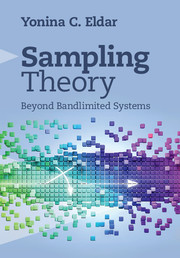Book contents
- Frontmatter
- Dedication
- Contents
- Preface
- 1 Introduction
- 2 Introduction to linear algebra
- 3 Fourier analysis
- 4 Signal spaces
- 5 Shift-invariant spaces
- 6 Subspace priors
- 7 Smoothness priors
- 8 Nonlinear sampling
- 9 Resampling
- 10 Union of subspaces
- 11 Compressed sensing
- 12 Sampling over finite unions
- 13 Sampling over shift-invariant unions
- 14 Multiband sampling
- 15 Finite rate of innovation sampling
- Appendix A Finite linear algebra
- Appendix B Stochastic signals
- References
- Index
11 - Compressed sensing
Published online by Cambridge University Press: 05 August 2014
- Frontmatter
- Dedication
- Contents
- Preface
- 1 Introduction
- 2 Introduction to linear algebra
- 3 Fourier analysis
- 4 Signal spaces
- 5 Shift-invariant spaces
- 6 Subspace priors
- 7 Smoothness priors
- 8 Nonlinear sampling
- 9 Resampling
- 10 Union of subspaces
- 11 Compressed sensing
- 12 Sampling over finite unions
- 13 Sampling over shift-invariant unions
- 14 Multiband sampling
- 15 Finite rate of innovation sampling
- Appendix A Finite linear algebra
- Appendix B Stochastic signals
- References
- Index
Summary
One of the most well-studied examples of a union of subspaces is that of a vector x that is sparse in an appropriate basis. This model underlies the rapidly growing field of compressed sensing (CS), which has attracted considerable attention in signal processing, statistics, and computer science, as well as the broader scientific community. In this chapter, we provide a review of the basic concepts underlying CS. We focus on the theory and algorithms for sparse recovery in finite dimensions. In subsequent chapters, we will see how the fundamentals presented in this chapter can be expanded and extended to include richer structures in both analog and discrete-time signals, ultimately leading to sub-Nyquist sampling techniques for a broad class of continuous-time signals.
Motivation for compressed sensing
The sampling theorems we studied in previous chapters, including the celebrated Shannon-Nyquist theorem, are at the heart of the current digital revolution that is driving the development and deployment of new kinds of sensing systems with ever increasing fidelity and resolution. Digitization has enabled the creation of sensing and processing systems that are more robust, flexible, cheaper, and, consequently, more widely used than their analog counterparts. As a result of this success, the amount of data generated by sensing systems has grown from a trickle to a torrent. Unfortunately, in many important and emerging applications, the resulting sampling rate is so high that we end up with far too many samples that need to be transmitted, stored, and processed.
- Type
- Chapter
- Information
- Sampling TheoryBeyond Bandlimited Systems, pp. 390 - 471Publisher: Cambridge University PressPrint publication year: 2015



